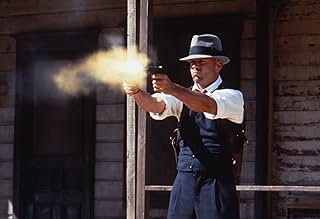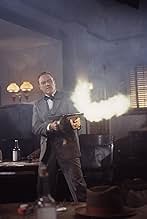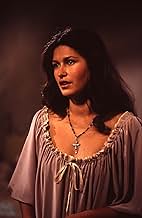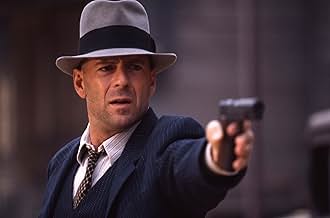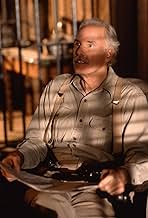A drifting gunslinger-for-hire finds himself in the middle of an ongoing war between the Irish and Italian mafia in a Prohibition era ghost town.A drifting gunslinger-for-hire finds himself in the middle of an ongoing war between the Irish and Italian mafia in a Prohibition era ghost town.A drifting gunslinger-for-hire finds himself in the middle of an ongoing war between the Irish and Italian mafia in a Prohibition era ghost town.
- Director
- Writers
- Stars
- Director
- Writers
- All cast & crew
- Production, box office & more at IMDbPro
Featured reviews
The film's final action scene is an awful, indescribable mess, and I have always wondered why Hill and usual editor Freeman Davies opted to construct it this way. It is a shootout presented in a series of dissolves, and it just doesn't work. Hill has always been an adroit director and editor of action, and his fine work has a precision to it that this sequence lacks. Perhaps the camera negatives were damaged or the studio ordered a truncation. Whatever the reasons are for this flawed sequence, it, unfortunately, turns a great movie into a good movie.
The opening sequence, replete with Ry Cooder's smooth scoring, is poetic and beautiful; Willis's arrival in town is directed with skill and energy; and cudos are also in order for the scene in which the first shot is fired and a stuntman is sent flying through a door into the dusty street outside.
Christopher Walken is fantastic as the violent enforcer Hickey, and it is great to see David Patrick Kelly back on the screen as the malicious Doyle.
There are many standout sequences and much to enjoy. Willis's solitary siege of a brothel, for example, is classic Hill stuff in terms of its staging, unapologetic brutality and superb cutting.
That the film is a remake of a remake is of no consequence to me. It is still a rousing, spare piece of masculine entertainment with a whiff of Peckinpah, a dash of Kurosawa, and a splatter of Corbucci.
That ain't no bad thing.
Since then, I have watched all the films several times. Now is as good a time as any to reflect on the matter again.
The Last Man Standing does not hold up as well as I had hoped; the saturated sepia tones of the film now appear to be a mannerist affectation. It was certainly a transitional film for Willis - the role is pretty heavy - but the Sixth Sense rewrote the book on Willis far better than any of his other off-cast roles could, since (unlike the others) it never made any pretense at being an action film. The voice over is a little pretentious. And its clear that Hill let the Gothic tone of the film overwhelm his efforts at black comedy. And oddly enough, despite its violence the film could use more action.
Yet the film remains historically important, if nothing else, because it now appears to have been the last of a cycle. Although even Jean-Claude Van Damme actually appeared in a "Yojumbo" clone - "Desert Heat" - and there have been other attempts to revive Hammett's essential narrative (e.g. the "Doom" robot film by Albert Pyun) the fact remains that the nameless outsider quick on the draw is fast slipping into the realm of pure 20th century myth. He doesn't really belong in the era of Computer graphics, invasions of Iraq, wars against non-existent terrorism. His blood is part whiskey, but it's human blood; and he may be a killer, but he won't be a party to genocide. He's too real, and yet too good, for the 21st century rushing in on us.
I take the darkly sepia-toned Last Man Standing as a final farewell to a hero of the previous century, just as Hitchcock's 39 Steps effectively said farewell to the romantic adventurer of the 19th century. Every era has its heroes; and it is sad that Sanjuro/John Smith/the Man with No Name can no longer be one of ours. It's probably too much to ask, but hopefully someone better - or at least as good - will come along.
-E. J. Winner.
Walter Hill's variant on Yojimbo, plot basically sees Willis as drifter John Smith, who after arriving in the dusty town of Jericho, promptly sets about making some serious cash by playing the town's two gangs off against each other. Smith is one tough hombre, a deadly pistoleer who has a fear of nothing, which is why the two respective gang leaders want him to work for them. Noses get put out of joint, blood flows, scores settled and a anti-hero is born, complete with permanent scowl and dry narration.
The look and sound is terrific, Cooder's pessimistic twangs are all over the plot, while the visuals dovetail between sun-baked landscapes and the misty lensed ghost town of Jericho. Hill brings his trademark stylish violence into play, with slow-mos and rapid fire shoot-outs impressive, while his skill at creating an antique atmosphere is very much in evidence. Unfortunately the narrative isn't up to much, it lacks scope and characters merely exist, making this very much a style over substance exercise. It also means that much of the cast are given only morsels to feed on. A shame when you got Walken and Kelly on overdrive when on screen.
It's an odd blend of a Western with Prohibition Noir characters, but it's unmistakably a Walter Hill film. For his fans there's enough to like about it whilst accepting it's a bit of a throwaway on the page. For the casual crime/action film fan, however, it's likely to be much ado about nothing. 7/10
The Plot then is basically Bruce Willis's character playing both sides for whatever he can get. He is grimly cool in a certain way. The gangs then are the Irish, led by Doyle, and the Italians, led by Strozzi. These gangs are essentially copies of each other except for their names and accents, and perhaps their faces. The only difference of course being that Doyle has a psychotic second-in-command, or so we are told at the start of the movie. He, as a psychotic, is played by the true mother of all psychotic playing actors.... You guessed it, Christopher Walken, essentially playing Christopher Walken. The only other occupants of the town then are the sheriff, bartender, and undertaker.
In the end this is movie is certainly a dark one, although it is also not particularly serious in terms of realism. The atmosphere is extremely dark and grim as many characters are killed by Willis as well as Walken. It may actually be found depressing later on in the movie. However, contrary to this, the violence is often slightly comical. In one instance as many as forty bullets are needed to take down a character, and in others people, after having been shot by pistols, fly back several yards in the air. Something will certainly work for everyone who sees this movie, however only some will find all of these mixed aspects pleasurable when placed together as they have been here. This movie definitely employs major style, both in its shoot-outs and visual style. In parts of this film, the color has been diluted so much that it appears more or less selectively colored, such as in Sin City but not so much so. This will work for noir fans as well as those who find this bold style innovative and original, but others will find that it contributes more-so merely to the grim nature of this movie. The shoot-outs, undeniably are the best part of this movie and is all you desire is some good action then this movie fills that desire well. While this movie prefers darkness over fun, the stylistic and violent gunfights as well as the dark style will appeal to many, as it has to me. 7/10
First off I will never understand why Walter Hill does not have a better reputation. He's probably best known for his commercial success with the 48 Hrs films, and his other brilliant features get criminally overlooked. He scored a cult hit with "The Warriors", he delivered one of the best westerns ever with "The Long Riders", and put all other car chase movies to shame with the ultra cool "The Driver." As anyone who has seen these films should realise, Hill should be mentioned in the same breath as Peckinpah, Woo and Rodriguez when it comes to slow-mo gunplay.
"Last Man Standing" doesn't rival these earlier works, but it is a tough, gritty film with some fantastic shootouts. It doesn't hold itself back in terms of blood and violence, something current US films of the genre are guilty of doing. It has everything an action film needs; tough antihero, loath able bad guys, a creepy main villain and plenty of cannon fodder. As long as you don't get hung up on technicalities (ie the guns fire ten times more ammo than they hold) you should be entertained.
It doesn't feel like any effort went into the screenplay, but Hill adds some nice touches to the film in terms of nods towards the source material. I particularly like the opening where Bruce spins his empty whisky bottle on the ground to decide which road to take; a clear reference to Toshiro Mifune throwing a stick into the air to decide on his path. There is also an interesting cast; there's earlier Hill collaborator Bruce Dern (The memorable villain from The Driver), William Sanderson (Blade Runner) and of course Christopher Walken, who chews the scenery talking tough with his hoarse accent and threatening people with a Tommy gun. His performance is really the most memorable thing about the film. Willis is not Mifune or Eastwood, but he does suit the mysterious drifter character well and this is one of his better action man roles.
All things said, the film certainly doesn't come close to "Yojimbo", but it does give the more rough hewn "Fistful of Dollars" a run for its money. By no means a masterpiece, "Last Man Standing" should still provide enough for any action fans tired of watered down mainstream Hollywood nonsense that currently dilutes cinemas. It is certainly a lot better than its reputation makes out.
Did you know
- TriviaThis movie, like Pour une poignée de dollars (1964), is a retelling of the story in Le Garde du corps (1961), which is itself based on Dashiell Hammett's 1927 novel "Red Harvest".
- GoofsSmith carries two Colt 45. s that hold 7+1 rounds or 14+2 rounds. Smith fires way more bullets than that.
- Quotes
Capt. Tom Pickett: Things in this town are out of control. Two gangs is just one too many. I'm not an idealist. I know a lot of things that people do are awful low, but that's between them and God. Do you believe in God? I believe in God, son. But what I'm concerned with is keeping a lid on things, and what we got here in Jericho is just way out of hand, and Sheriff Galt here can't do much about it, right? Matter of fact, it might be fair to say that he's part of the problem, right? Now you been going back and forth playing both sides according to Mr. Galt, here, making yourself a lot of money out of all this. Well, it's over, son. I'm coming back here in ten days, and I'm gonna bring about 20 rangers with me. I will tolerate one gang because that is the nature of things. A certain amount of corruption is inevitable. But if I find two gangs here when I get back, then in a couple of hours there will be no gangs here. So it's simple. One gang quits and goes home. You boys work it out. I don't give a damn which one.
John Smith: Just so long as one side leaves or maybe one side loses.
Capt. Tom Pickett: That's fine, too, son. Kill as many as you want. Just don't kill no innocent people around here. I wouldn't like that.
Details
Box office
- Budget
- $67,000,000 (estimated)
- Gross US & Canada
- $18,115,927
- Opening weekend US & Canada
- $7,010,333
- Sep 22, 1996
- Gross worldwide
- $47,267,001
- Runtime1 hour 41 minutes
- Color
- Sound mix
- Aspect ratio
- 2.39 : 1
Contribute to this page



